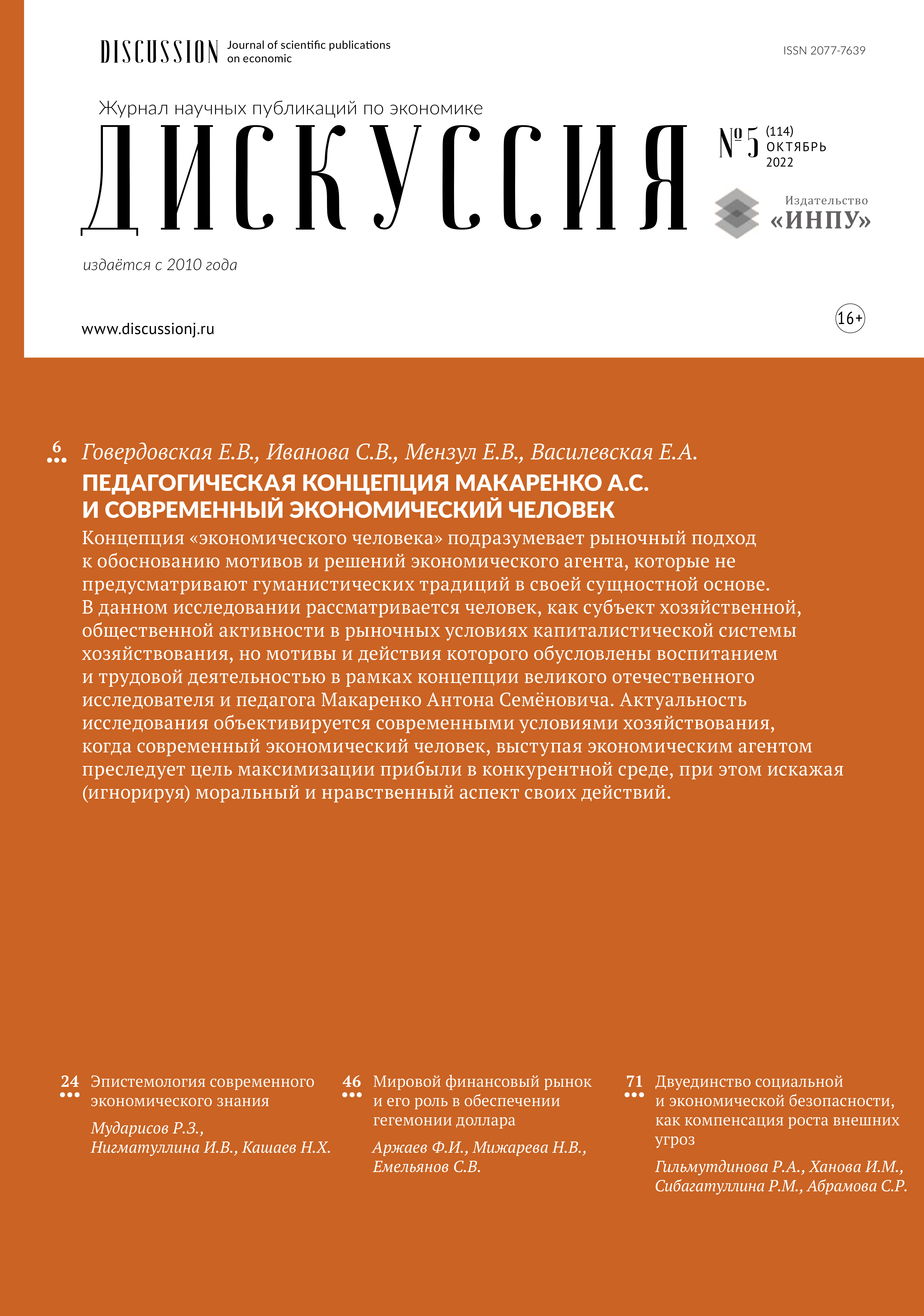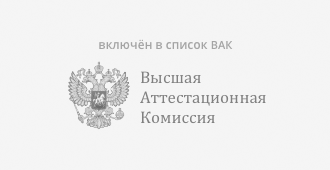CORRESPONDENCE OF THE ECONOMIC ETHICS OF THE CONCEPTS OF UTILITARIANISM AND LIBERALISM TO MODERN ECONOMIC CONDITIONS
Keywords:
Economic liberalism, egalitarianism, neoliberalism, libertarianism, interventionism, consequentialism, hedonism, good, utility, deontologyAbstract
Ethical behavior reflects the morality of economic action and the content of economic policy. The well-being of society depends on the ethics and morals of the subject of economic activity, and corporate ethics, for example, acts as a reflection of this. But the content of the concept is a determining factor in the construction of further economic policy and conscious economic activity. The object of the study is normative ethics, which answers the question of what economic actions should be taken so that the actions of economic results have a moral meaning. The subject of the study is the ethical concepts of utilitarianism and liberalism. The purpose of the study is to describe the content of concepts and the projection of this content on the existing economic reality. The objectives of the study are as follows: 1. To consider the content of classical liberalism and classical utilitarianism; 2. To consider authoritative theoretical sources and opinions of researchers of the subject area; 3. To draw reasonable conclusions. The methodology of the research is a normative economic and philosophical approach to the phenomena under study. The result of the study is the detection of existing contradictions in the ethical concepts of utilitarianism and liberalism. A proposal to use pragmatic ethics as a concept stating that moral correctness develops in the same way as other types of knowledge – socially and economically in the evolution of social structure and economic ties – and that norms, principles and moral criteria are likely to be improved as a result of research.
Downloads
Metrics
References
Young, Shaun Beyond Rawls: An Analysis of the Concept of Political Liberalism. Lanham, MD: University Press of America, 2002.- ISBN 978-0-7618-2240-0.
Bresser-Pereira L. C. Five models of capitalism //Brazilian Journal of Political Economy. – 2012. – Т. 32. – С. 21-32.- DOI: 10.1590/S0101-31572012000100002.
Lawson R. A., Murphy R., Powell B. The determinants of economic freedom: A survey //Contemporary economic policy. – 2020. – Т. 38. – №. 4. – С. 622-642.- DOI: 10.1111/coep.12471.
De Haan J., Sturm J. E. On the relationship between economic freedom and economic growth //European journal of political economy. – 2000. – Т. 16. – №. 2. – С. 215-241.- DOI: 10.1016/S0176-2680(99)00065-8.
Gwartney J. D., Lawson R. A., Holcombe R. G. Economic freedom and the environment for economic growth //Journal of Institutional and Theoretical Economics (JITE)/Zeitschrift für die gesamte Staatswissenschaft. – 1999. – С. 643-663.
Carlsson F., Lundström S. Economic freedom and growth: Decomposing the effects //Public choice. – 2002. – Т. 112. – №. 3. – С. 335-344.- DOI: 10.1023/A:1019968525415.
Easton S. T., Walker M. A. Income, growth, and economic freedom //The American Economic Review. – 1997. – Т. 87. – №. 2. – С. 328-332.
Klein L. R. The Life of John Maynard Keynes //Journal of Political Economy. – 1951. – Т. 59. – №. 5. – С. 443-451.- DOI: 10.1086/257110.
Keynes J. M. The general theory of employment //The quarterly journal of economics. – 1937. – Т. 51. – №. 2. – С. 209-223.- DOI: 10.2307/1882087.
Jonsson P. O. On the economics of Say and Keynes' interpretation of Say's Law //Eastern Economic Journal. – 1995. - Т. 21. – №. 2. – С. 147-155.
Jackson B. At the origins of neo-liberalism: The free economy and the strong state, 1930–1947 //The Historical Journal. – 2010. – Т. 53. – №. 1. – С. 129-151.- DOI: 10.1017/S0018246X09990392.
Hoppe H. H. From the Economics of Laissez Faire to the Ethics of Libertarianism //The Economics and Ethics of Private Property. – Springer, Dordrecht, 1993. – С. 173-193.- DOI: 10.1007/978-94-015-8155-4_8.
Thorsen D. E., Lie A. What is neoliberalism //Oslo, University of Oslo, Department of Political Science, Manuscript. – 2006. – С. 1-21.
Rawls J. Political liberalism //The New Social Theory Reader. – Routledge, 2020. – С. 123-128.- ISBN 9781003060963.
Hayek F. A. Law, legislation and liberty: a new statement of the liberal principles of justice and political economy. – Routledge, 2012.- DOI: 10.4324/9780203103814.
Lynch K. From a neo-liberal to an egalitarian state: Imagining a different future //TASC Annual Lecture, Royal Irish Academy, Dublin, June 17th 2010. – 2010.
Bentham J. The collected works of Jeremy Bentham: An introduction to the principles of morals and legislation. – Clarendon Press, 1996.- С. 456.- ISBN 0191589756, 9780191589751.
Van Staveren I. Beyond utilitarianism and deontology: Ethics in economics //Review of Political Economy. – 2007. – Т. 19. – №. 1. – С. 21-35.- DOI: 10.1080/09538250601080776.
Stigler G. J. The development of utility theory. I //Journal of political economy. – 1950. – Т. 58. – №. 4. – С. 307-327.
Sen A. Positional objectivity //Philosophy & public affairs. – 1993. – С. 126-145.
Bentham J. Deontology; or, The Science of Morality.: In two volumes. – Adegi Graphics LLC, 2014.
Van Staveren I. The values of economics: An Aristotelian perspective. – Routledge, 2013.- С. 256.-DOI: 10.4324/9780203122396.
McCloskey D. N. The rhetoric of economics. – Univ of Wisconsin Press, 1998.- С. 248.- ISBN 0299158136, 9780299158132.
Hausman D., McPherson M., Satz D. Economic analysis, moral philosophy, and public policy. – Cambridge University Press, 2016.
Mongin P. Spurious unanimity and the Pareto principle //Economics & Philosophy. – 2016. – Т. 32. – №. 3. – С. 511-532.- DOI: 10.1017/S0266267115000371.
Fraser N. Feminism, capitalism and the cunning of history //Citizenship rights. – Routledge, 2017. – С. 393-413.
Fesmire S. John Dewey and moral imagination: Pragmatism in ethics. – Indiana University Press, 2003.-184 с.
Liszka J. What is Pragmatic Ethics? //Society for the Advancement of American Philosophy, 32th Annual Meeting. – 2005.
Маркс К. Капитал. Критика политической экономии. Том первый. Кн. 1 Процесс производства капитала. М., Политиздат, 1978.-907 с.
Downloads
Published
How to Cite
Issue
Section
Categories
License
Copyright (c) 2023 Р. К. Камалов, И. Ю. Рассолова, Ф. М. Гарипова

This work is licensed under a Creative Commons Attribution-NonCommercial-NoDerivatives 4.0 International License.
Авторы, публикующие произведения в журнале «Дискуссия», соглашаются со следующими условиями:
- Авторы сохраняют за собой авторское право и предоставляют журналу право первой публикации произведения, одновременно лицензированной в соответствии с лицензией Creative Commons Attribution, позволяющей другим лицам пользоваться произведением с подтверждением авторства и первоначальной публикации в журнале «Дискуссия».
- Авторы вправе заключать с иными лицами лицензионные договоры на условиях простой (неисключительной) лицензии на использование опубликованного в журнале «Дискуссия» произведения (например, размещение его в базах данных университетов, публикация в книге), со ссылкой на его оригинальную публикацию в этом журнале.
- Автор гарантирует, что является правообладателем всех материалов, предоставляемых в редакцию, и что исключительные права на данные материалы не переданы или не предоставлены другим лицам.
- Авторам разрешено и рекомендуется размещать свое произведение в Интернете до и во время процесса подачи, поскольку это может привести к продуктивному обмену, а также к более раннему и более широкому цитированию опубликованных работ.
С момента загрузки произведения и сопроводительных материалов через раздел "Отправка материалов", автор полностью и безоговорочно принимает (акцептует) публичную оферту о заключении авторского соглашения об опубликовании произведения. В соотвтетствии с этим соглашением автор предоставляет издателю на безвозмездной основе неисключительную лицензию на использование созданного автором произведения.
С момента получения произведения и прилагаемых к нему материалов журнал "Дискуссия" вправе использовать полученные произведения без ограничений по своему усмотрению и в пределах всего срока действия исключительных прав, но с обязательным указанием имени автора (авторов) произведения, в том числе публиковать произведения (полностью или в сокращении) на территории всего мира, переводить на другие языки, направлять в репозитории научной информации, размещать в сети Интернет и использовать другими законными способами.









